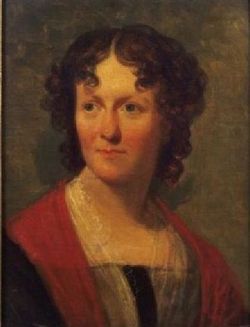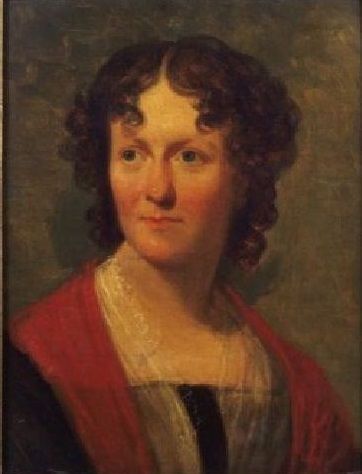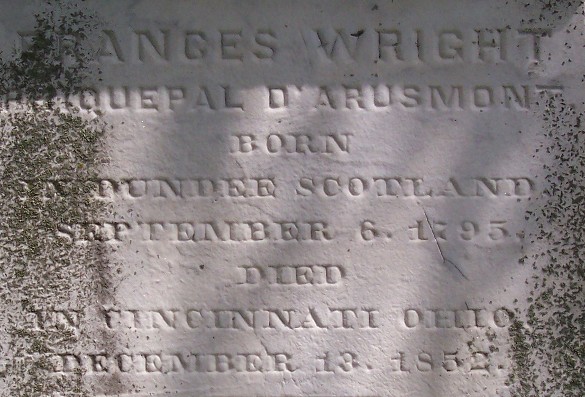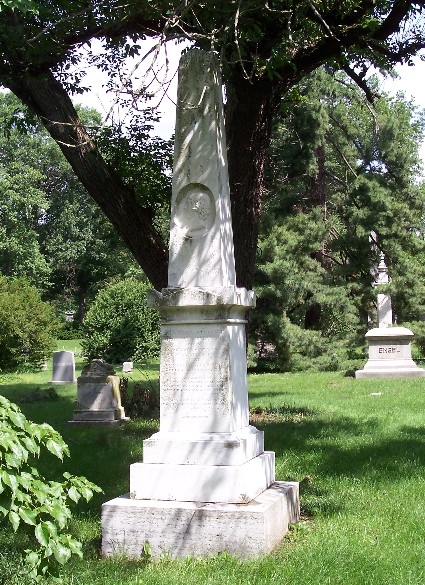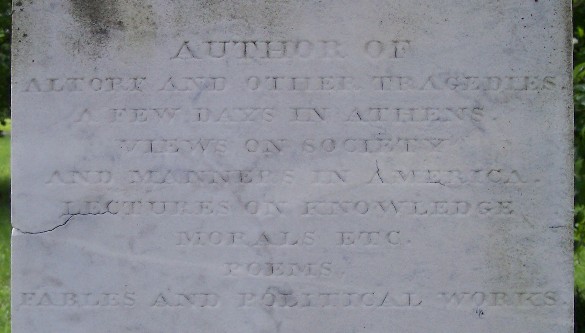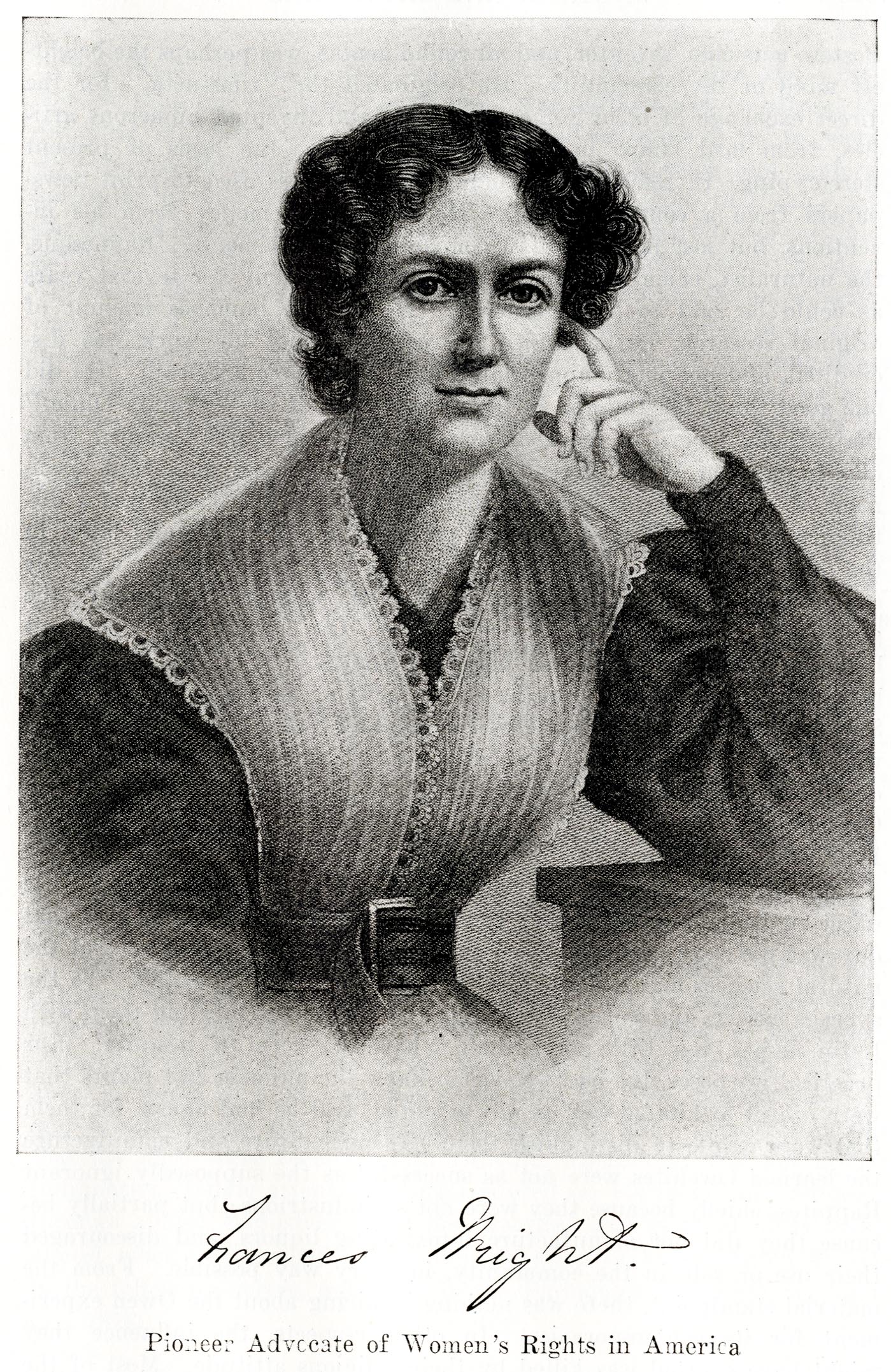Wright visited the United States in 1818 and after returning to England published her observations of the country in her book, Views of Society and Manners in America (1821). The book praised America's experiments in democracy and provided information for those radicals in Britain involved in the struggle for parliamentary reform.
In England she became a friend and confidante of the Marquis de Lafayette and together they returned to the United States in 1824. Later that year Wright visited New Harmony in Indiana, a socialist community and based on her observations and that community's experience she decided to form her own cooperative community.
In 1825 Wright became a US citizen and purchased 2,000 acres of woodland thirteen miles east of Memphis, near the present city of Germantown, Tennessee and formed a cooperative community called Nashoba. Wright bought slaves from neighboring farmers, freed them, and gave them land on her settlement. Wright's community was extremely controversial. She espoused feminism, sexual freedom, the abolition of slavery, and equal political rights. Wright spent most of her personal fortune on Nashoba but it never became economically self-sufficient and in 1828 she was forced to abandon her experiment. Wright arranged for the former slaves to be sent to Haiti.
In 1829 Wright settled in New York where she published her book, Course of Popular Lectures. She also combined with Robert Dale Owen to publish the Free Enquirer. In the journal Wright advocated socialism, the abolition of slavery, universal suffrage, free secular education, birth control, changes in the marriage and divorce laws. Wright and Owen also became involved in the radical Workingmen's Party while living in New York. The party had some brief electoral success, but foundered over Wright's advocacy of government sponsored boarding schools for children, an advocacy that had no popular support with the workers.
Wright married a French doctor, Guillaume P. D'Arusmont in 1831 and had a child but the marriage was not a success and ended in divorce. Ironically, or inevitably under nineteenth century law, her husband gained control over her entire property, including her earnings from lectures and the royalties from her books. Fanny Wright was in the middle of a legal struggle with D'Arusmont, when she died.
Wright visited the United States in 1818 and after returning to England published her observations of the country in her book, Views of Society and Manners in America (1821). The book praised America's experiments in democracy and provided information for those radicals in Britain involved in the struggle for parliamentary reform.
In England she became a friend and confidante of the Marquis de Lafayette and together they returned to the United States in 1824. Later that year Wright visited New Harmony in Indiana, a socialist community and based on her observations and that community's experience she decided to form her own cooperative community.
In 1825 Wright became a US citizen and purchased 2,000 acres of woodland thirteen miles east of Memphis, near the present city of Germantown, Tennessee and formed a cooperative community called Nashoba. Wright bought slaves from neighboring farmers, freed them, and gave them land on her settlement. Wright's community was extremely controversial. She espoused feminism, sexual freedom, the abolition of slavery, and equal political rights. Wright spent most of her personal fortune on Nashoba but it never became economically self-sufficient and in 1828 she was forced to abandon her experiment. Wright arranged for the former slaves to be sent to Haiti.
In 1829 Wright settled in New York where she published her book, Course of Popular Lectures. She also combined with Robert Dale Owen to publish the Free Enquirer. In the journal Wright advocated socialism, the abolition of slavery, universal suffrage, free secular education, birth control, changes in the marriage and divorce laws. Wright and Owen also became involved in the radical Workingmen's Party while living in New York. The party had some brief electoral success, but foundered over Wright's advocacy of government sponsored boarding schools for children, an advocacy that had no popular support with the workers.
Wright married a French doctor, Guillaume P. D'Arusmont in 1831 and had a child but the marriage was not a success and ended in divorce. Ironically, or inevitably under nineteenth century law, her husband gained control over her entire property, including her earnings from lectures and the royalties from her books. Fanny Wright was in the middle of a legal struggle with D'Arusmont, when she died.
Family Members
Advertisement
Advertisement
